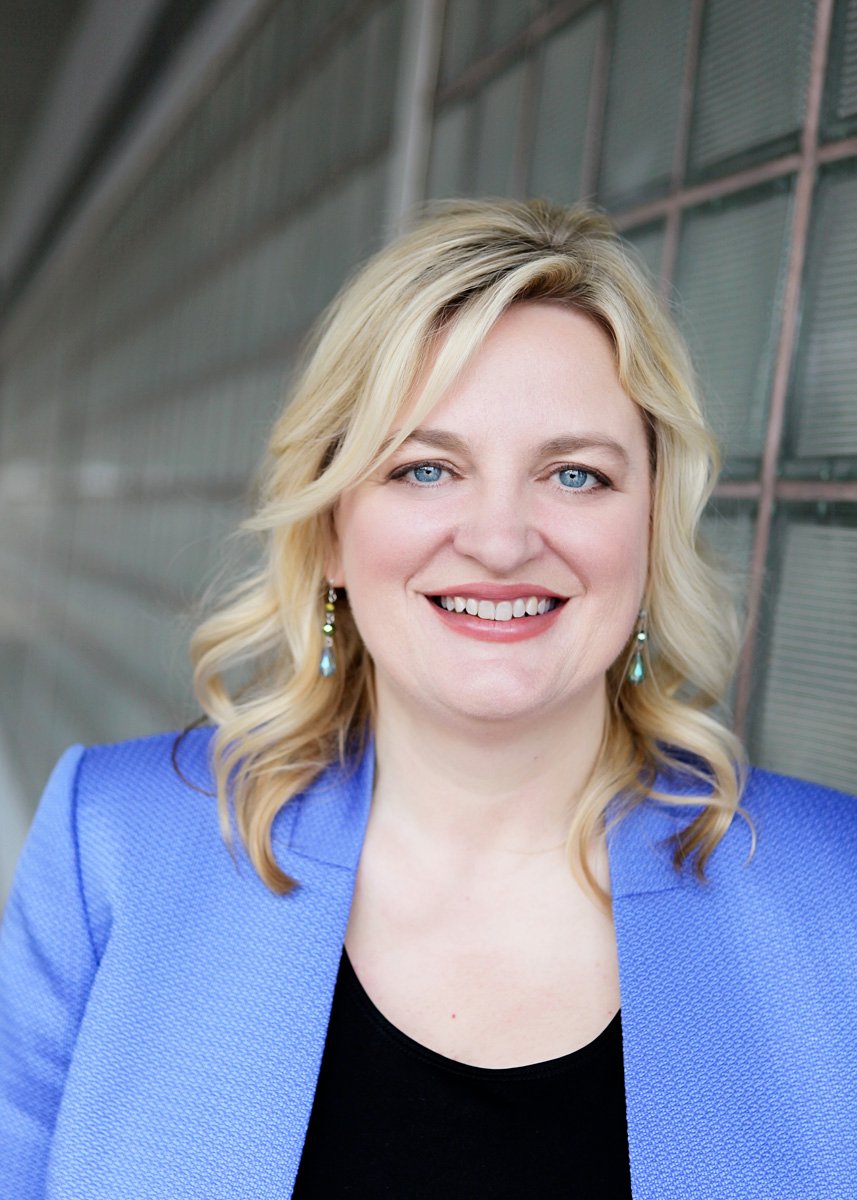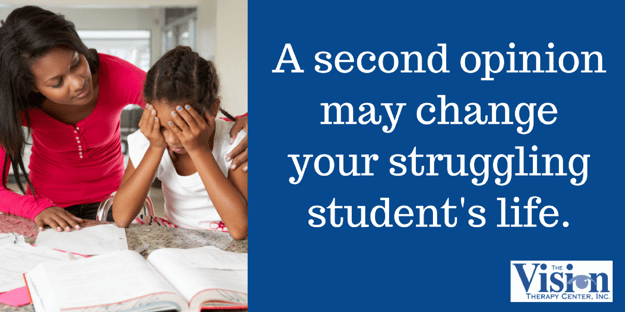
If your child is struggling in school, you may have been told “nothing is wrong.” However, the issue may be an undetected functional vision problem. This post details five reasons when getting a second opinion may help you find this often-overlooked issue.
When struggling students come to us, they often have had an assessment of their eyesight, but the testing did not reveal any problems. Unfortunately, their functional vision skills haven’t been assessed, so it appears that the student is seeing “just fine.” In fact, they may even have 20/20 eyesight.
Getting a “second opinion” in this case involves testing for visual skills that have not been evaluated yet. We’ll explain what those “functional vision skills” are in just a bit, but first, let’s look at how research reveals getting a second opinion can change your life -- for the better.

What is a Second Opinion? (And Why You Should Get One)
A second opinion involves reaching out to another medical expert for diagnosis confirmation or a separate set of tests and analysis before receiving treatment.
According to research conducted by the Mayo Clinic, seeking a second opinion may be a good idea if you’re uncertain about your initial diagnosis. They report that among patients who seek a second opinion, “88 percent...go home with a new or refined diagnosis -- changing their care plan and potentially their lives.”
Conversely, “only 12 percent receive confirmation that the original diagnosis was complete and correct.”
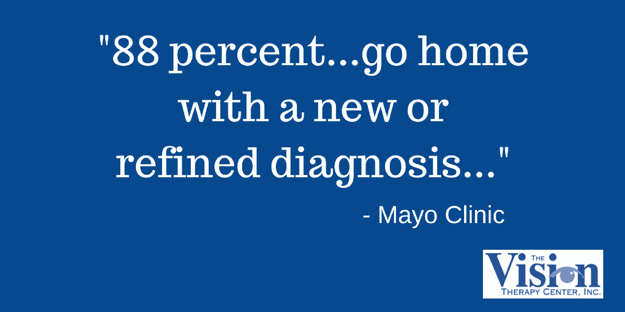
Does that mean every diagnosis you receive is wrong? We don’t believe so, and we don’t pass along that statistic to keep you up at night. But we do pass it along so that you may consider a second opinion when you’re told, “Nothing is wrong.”
When to Get a Second Opinion With a Vision Problem
Meet Synara. Her child, Daniel, was struggling in school. Synara knew Daniel was bright, and her teacher agreed, telling her that he would grow out of his initial struggles. Unfortunately, he didn’t, and eventually Synara had Daniel tested by a specialist.
The conclusion: He’s fine.
Fortunately, Synara mentioned Daniel’s struggles to a friend, who recommended he get his vision tested at The Vision Therapy Center. That didn’t make sense to Synara, as she had Daniel’s eyesight tested and was told he could see “20/20.”
.png?width=625&name=10.14.17%20TVTC%202ndop-%20settle%20(1).png)
But Synara’s friend was referring to functional vision, which goes beyond eyesight. Functional vision is how your entire visual system -- the eyes, the brain, the visual pathways -- work together to help you interact with your environment. Functional vision includes the visual skill areas of eye teaming, eye focusing and eye movement, all of which are critical for success in school.
When we tested Daniel’s vision, we discovered a problem. The subsequent vision therapy made dramatic improvements in his schoolwork and life.
“If you think something is wrong, there probably is a problem,” Synara says. Watch the video to see Synara’s story.
When Should You Ask for a Second Opinion?
Here are some reasons to consider a second opinion when you have a child struggling in school:
1. Your child is bright but struggling in schoolIf you have a bright child who seems to be struggling with schoolwork like Daniel was, AND the teachers and educational support staff can’t seem to find anything wrong, you may want to look for a second opinion outside of school.
2. Your physician or eye doctor aren’t familiar with functional visionIf your child is struggling in school, but your physician or eye doctor are unable to identify a cause, be sure to ask him or her about functional vision problems. If they are unfamiliar with functional vision, you may want to ask for a second opinion from a developmental optometrist. A developmental optometrist has received specialized training and/or board certification in the diagnosis and treatment of functional vision problems.
3.You’re told your child has 20/20 eyesight, but still has blurry visionThe Snellen eye chart is used to determine visual acuity, or your ability to see an object clearly. Most of the time it doesn’t reveal any information that would be helpful in detecting functional vision problems, which include issues with eye tracking, eye movement and eye focusing. You can have 20/20 eyesight AND a functional vision problem.
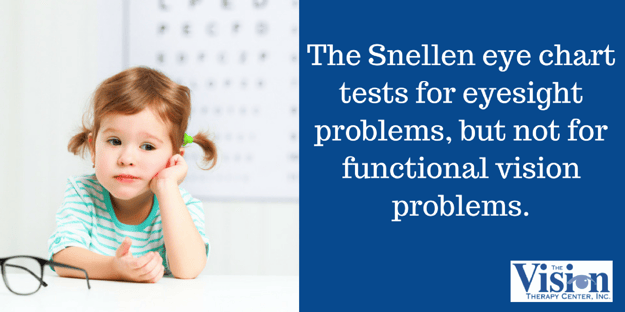
If your child is experiencing blurry vision but eyesight testing with the Snellen eye chart indicates 20/20 vision, then you may want to seek a second opinion.
4. You’re told that your child needs surgeryIn cases of strabismus, or ‘crossed eyes,’ surgery may be recommended. The surgery may address cosmetic issues, but may not address the underlying issue of poor functional vision. A second opinion in which functional vision is evaluated is warranted in these cases.
5. You’re uncertain of the diagnosisToo often in life we just don’t trust our gut or what Synara calls her “mother’s intuition.” In cases where you receive a diagnosis but the treatment plan doesn’t seem to be addressing the root cause, you should pursue a second opinion.

How to Get a Second Opinion
In many cases, you don’t need a referral for a second opinion. You can simply seek out another physician -- in this case, a developmental optometrist skilled at testing for functional vision problems.
If you do need to ask for a referral, simply ask your physician or eye doctor, and be sure to mention your concern about whether there may be a functional vision problem.
Sometimes people feel intimidated or even don’t want to hurt their doctor’s feelings. There’s no reason to feel this way. Any doctor should be open to the idea of getting a second opinion.
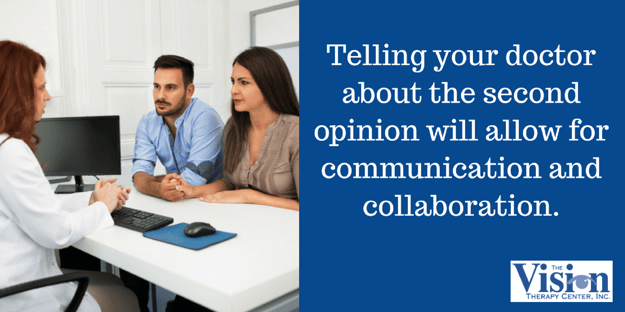
Should You Avoid Telling Your Doctor That You are Getting a Second Opinion?
We recommend informing your doctor that you are seeking a second opinion. Keeping communication lines open between yourself and your physicians will increase the potential for collaboration and lead to the best outcome.
Does Insurance Cover Second Opinions?
This can vary based on the insurer, individual plan benefits and the physician providing the second opinion. Contact your insurer to get a definitive answer on this before scheduling the appointment.
In the event that your insurer won’t cover the visit, you may consider paying out of pocket. An examination to assess functional vision at our office costs around $200 and may reveal treatment options that were previously not offered.
Valuable Resources to Help You Find a Second Opinion
While finding a reliable source for a second opinion may seem like a daunting task, there are excellent resources to help you both learn more about functional vision and find a developmental optometrist in your area.

First, you’ll want to research your child’s issue online. Our website, for example, has numerous success stories, as well as in-depth descriptions of different types of functional vision problems. You can even take the Vision Quiz to see if you or your child is exhibiting symptoms of a functional vision problem.
There is also a strong Facebook group called Vision Therapy Parents Unite whose members are patients, parents and doctors who can provide additional information and insight.
If you’re looking to find a doctor, the College of Optometrists in Vision Development has a great “Find a Doctor” feature that can lead you to an optometrist that is board-certified in vision development.
Remember, getting a second opinion is entirely warranted if you or your child’s current vision assessment does not include an evaluation of functional vision skills. By having this testing done, you may find the solution to an undetected problem.


